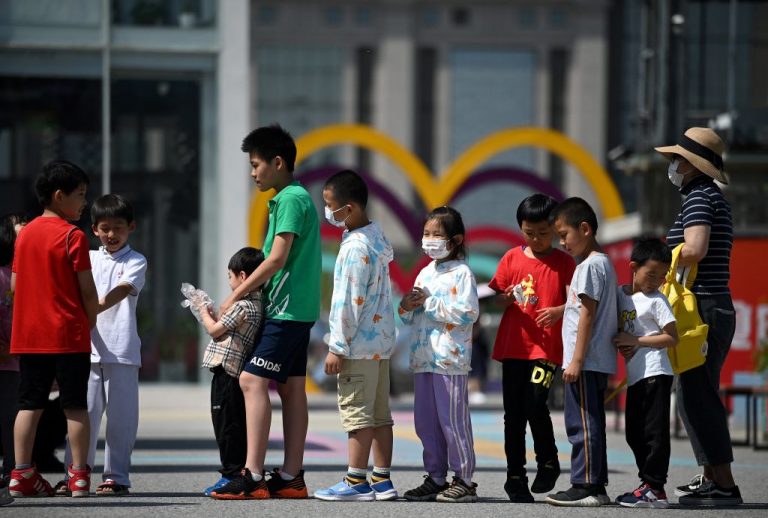A meeting of the Chinese Communist Party’s newly formed Central Financial and Economic Affairs Commission (CFEAC) deliberated on how to maintain a “high-quality” population while developing a “modern industrial system” — a pertinent matter given China’s rapidly falling birthrates.
Held on May 5 (Friday), the meeting of the CCP’s 20th Central Committee was presided over by Xi Jinping, who stressed that the economy must be guided by the Party’s central policies. He added that demographics are essential to the “great rejuvenation of the Chinese nation” and that the “overall quality” of the population must be improved.
According to Chinese official statistics, the total fertility rate (TFR) was just 1.3 children per woman in 2020, a little over just half of the 2.1 TFR needed to maintain or grow a population. Other estimates put the Chinese TFR even lower, at 1.16.
Moreover, the rapid industrialization and urbanization that China experienced since the 1980s, plus the CCP’s ill-conceived one-child policy, means that instead of going down gradually, China’s fertility rate fell from several children per woman to its current low in less than two generations.
This means that the younger generations of Chinese will be much smaller than those born before the one-child policy and era of fast economic development, and who are retiring from the workforce.
Success
You are now signed up for our newsletter
Success
Check your email to complete sign up
According to official statistics, India recently surpassed China to become the world’s most populous country.
The CFEAC meeting called for the CCP regime to address the shortage of births by taking action to maintain a “moderate fertility rate,” without specifying numbers. It also recommended providing more welfare to support prospective parents, finding ways to “stabilize” the labor force by “improving the efficiency” of human resource utilization, and implementing policies to support the growing elderly population.
Ideas such as “optimizing the regional economic layout and homeland spatial system,” and “maintaining population security” also cropped up in state media reports about the CCP leadership meeting.
According to political risk consultancy SinoInsider, which tracks developments in Chinese elite politics, the regime’s announcements about maintaining a “high quality” population are intended to ” to cover up the mistakes of its anti-natalist population policies over the past decades.”
By focusing of “quality,” the CCP could also want to drum up optimism about continued progress despite the declining population, the analysts wrote in a May 11 newsletter.
“However, we believe that the central and local governments have very limited financial capacity to support a pro-natalist drive,” SinoInsider wrote.
Vague talk, blunderous action
The CFEAC work meeting follows the pattern of Communist Chinese policymaking, which relies on mass campaigns and grandiose directives in hopes of achieving some effect, while reinforcing the Party’s control.
Recent examples include the ruinous “zero-COVID” policy, which locked down hundred of millions of people in their homes, leading to widespread psychological distress, economic damage, and numerous humanitarian disasters, such as people starving to death in their apartments or being unable to escape burning buildings.
During and after “zero-COVID,” the CCP has stressed the need for “food security,” resulting in sweeping, often nonsensical moves to force farmers and local authorities to convert land, including parks and produce, back to grain cultivation.
At the meeting, Xi and other senior officials also spoke about how to go about China’s industrial development. The meeting concluded that Chinese industry should avoid constantly comparing itself with that of more developed countries, not blindly strive for what is “big and foreign,” and that steps should be taken to reduce reliance on foreign imports.
In addition, the meeting warned against abandoning or neglecting “low-end” or “labor-intensive” sectors, and commended the role of “outstanding entrepreneurs” and “great artisans.”
SinoInsider wrote the CFEAC meeting and the details brought up at it reflect the CCP’s concerns about the economic and demographic crisis, as well as Beijing’s response to the worsening attitude of the U.S.-led global order towards China.
The “push to build a ‘modern industrial system’ sounds like an initiative to address the migration of supply chains outside of China, as well as the growing pressure on PRC [People’s Republic of China] manufacturing and supply chains stemming from the ‘tech war,’ ‘trade war,; selectively decoupling, and ‘friend-shoring’ strategies pursued by the U.S. and its allies,” SinoInsider wrote in its newsletter.
Meanwhile, the CCP leaders’ statements about the role of “low-end” industries, entrepreneurs, and artisans, seems to be intended to reassure those audiences that the “central government still values them and their contributions to the regime,” per SinoInsider.













